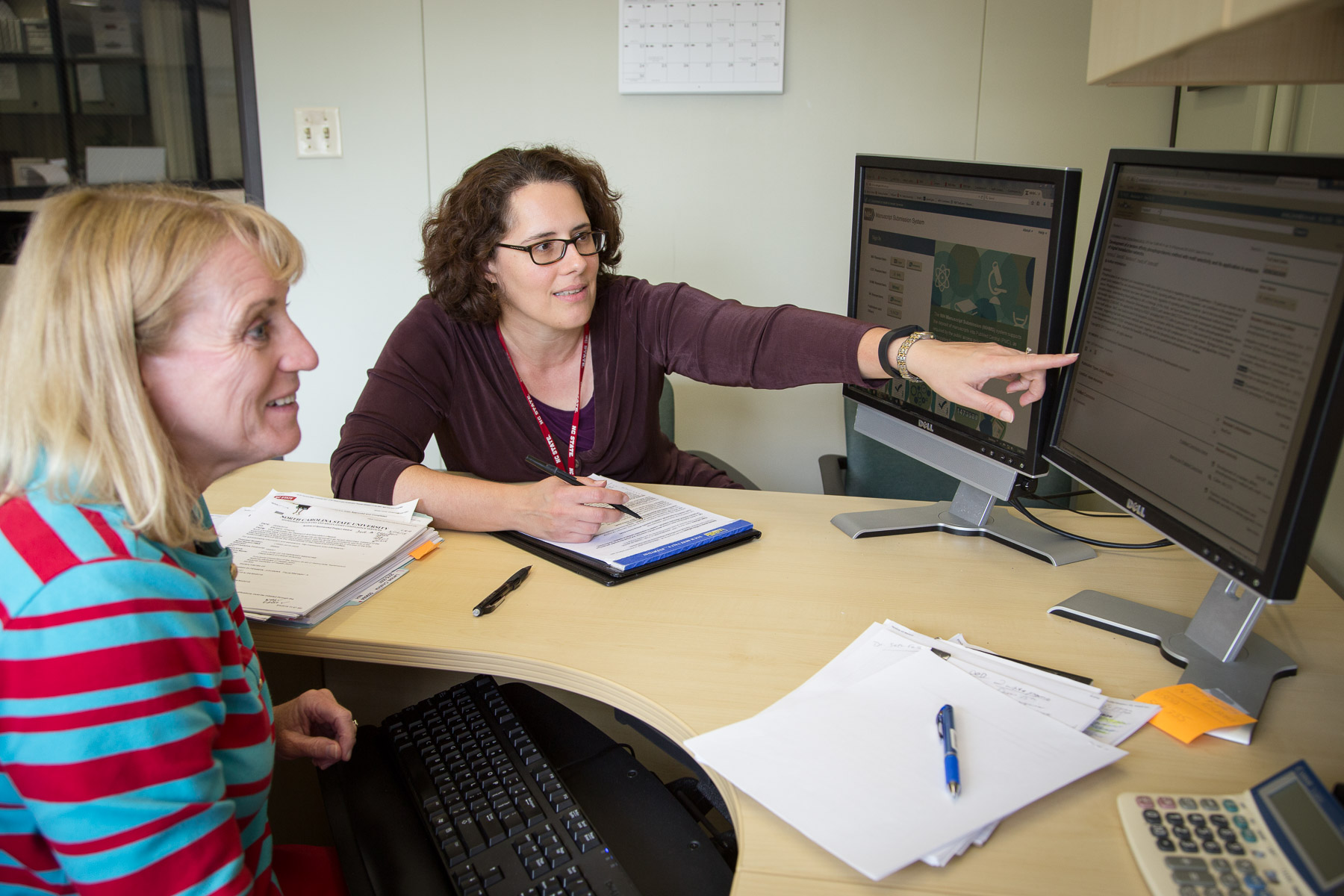
Supporting NCSU Researchers in Achieving NIH Public Access

When the NIH threatened to delay grant funding to researchers if they didn’t make their NIH-funded research publicly available, several NCSU librarians stepped in to help shepherd over 300 NC State publications to public access.
In April 2008, the National Institutes of Health (NIH) issued a mandate requiring all investigators receiving NIH funding to make the results of their research publicly accessible. The mandate went unenforced, however, until November 2012, when the NIH announced that it would freeze investigators’ grant funding if their NIH-funded research publications were not publicly available through the NIH’s PubMed Central repository.
 The National Institutes of Health requires all researchers' grant-funded work to be made publicly accessible through the PubMed Central Repository.
The National Institutes of Health requires all researchers' grant-funded work to be made publicly accessible through the PubMed Central Repository.
When the NIH announced its intent to enforce the mandate, NCSU librarian Kris Alpi recognized that this would impact the ongoing research of dozens of NCSU researchers. As an NIH reviewer herself, she was aware that publications could fail to make it into PubMed Central for a variety of reasons.
Compliance with the NIH mandate requires researchers to deposit, review, and approve all materials, a technical process often further complicated by an array of additional conditions and responsibilities tied to publication in a scholarly journal. Many journals permit deposit of only certain versions of an article and impose an embargo period that delays access for several months. Further, each journal has a distinct policy for facilitating deposit, leaving authors to navigate an environment where some articles must be approved and submitted by a journal but others must be managed by the author or team of co-authors. As a result, an author could find herself out of compliance - and thus facing a delay in funding - because she or a co-author had failed to complete the process, because her journal had not fulfilled its obligations, or simply because the NIH had not processed an otherwise-complete set of materials.
 A manuscript can get delayed at any of the five phases of the PubMed Central manuscript submission process.
A manuscript can get delayed at any of the five phases of the PubMed Central manuscript submission process.
Because librarians are familiar with biomedical literature, author agreements, and open access and have relationships with faculty, publishers, and the NIH, Alpi realized they were uniquely positioned to identify non-compliant research articles and to help guide them to compliance. Working with colleagues Hilary Davis and William Cross, Alpi reached out to SPARCS, NCSU’s office for Sponsored Programs and Regulatory Compliance, to offer the Libraries’ expertise and assistance.
 Librarians Will Cross and Hilary Davis worked with authors, publishers, and the NIH to ensure NIH funded research articles appeared in PubMed Central.
Librarians Will Cross and Hilary Davis worked with authors, publishers, and the NIH to ensure NIH funded research articles appeared in PubMed Central.
Alpi, Cross, and Davis searched scientific publication indexes to identify all NIH-funded articles authored by NCSU researchers since the mandate was issued in 2008. They found over 1,000 articles, in a wide variety of disciplines from physical sciences to social sciences, approximately 340 of which were not in PubMed Central, NIH’s designated public access repository.
 The NIH's PubMed Central Repository.
The NIH's PubMed Central Repository.
With that information in hand, they worked with journal publishers and NC State’s researchers and research administrators to help push articles toward public access. First, they identified the reasons an article might not be in PubMed Central, since manuscripts can get hung up at any one of the five phases of the process (illustrated below). If the article fails to proceed to the next stage, due to author, publisher or NIH error, the research will be considered non-compliant.
“It seemed easy in theory,” said Dr. Margaret Gruen at the College of Veterinary Medicine, “but [it] was much more complicated when I sat down to do it.”
Once they understood the process and its potential pitfalls, librarians took several measures to ensure that NCSU’s NIH-funded research appeared in PubMed Central. They identified researchers with extensive NIH funding and met one-on-one with them to triage the issues that were slowing their progress. They worked with research grant administrators on campus, including Jeneal Leone at the College of Veterinary Medicine, to develop a training program for students and researchers with NIH funding. And, with an eye toward improving the process for everyone, they held a conference call with the NIH and NCSU faculty members Dr. Marie Davidian and Dr. Shannon Holloway, where they provided examples of specific problems for NIH to check their systems and discussed ways to enable coordinators of multi-investigator projects to facilitate compliance across institutions.
 Dr. Marie Davidian from NCSU's Department of Statistics participated in a conference call with librarians and the National Institutes of Health.
Dr. Marie Davidian from NCSU's Department of Statistics participated in a conference call with librarians and the National Institutes of Health.
In the end, the Libraries helped NC State move over 300 articles from non-compliant status in January 2013 to compliant and publicly accessible in PubMed Central, an impressive 95% compliance rate. Librarians continue to assist NIH-funded authors in keeping the compliance rate high and ensuring public access to NC State-produced, NIH-funded research.
As more funding agencies implement public access requirements like those at the NIH, having a workflow and training programs in place will help make compliance simple and straightforward. Dr. Gruen commented that she now feels she has “the tools to both get back into compliance, as well as proactively determine what I need to do and when for future submissions.”



